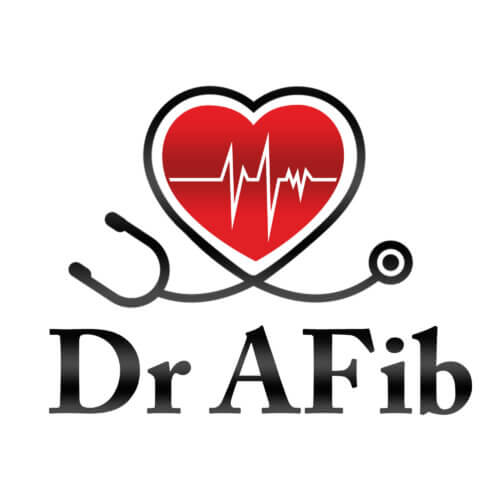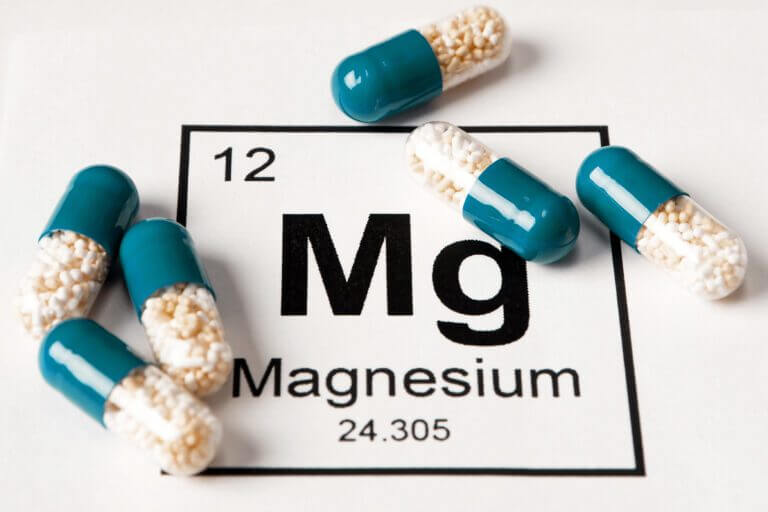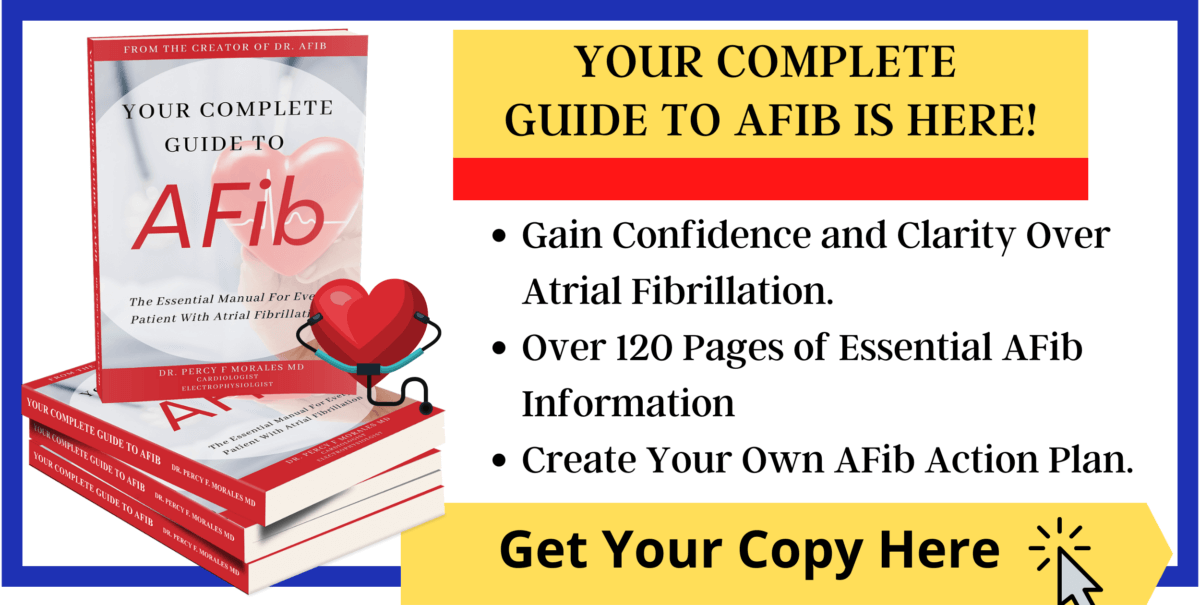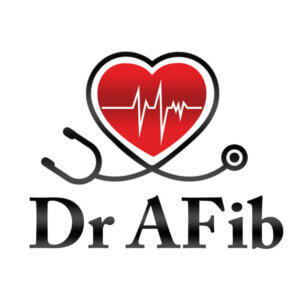Learn more about magnesium and AFib in this article. Does Magnesium deficiency cause atrial fibrillation? Do Magnesium supplements help With Atrial Fibrillation? Are there studies regarding magnesium deficiency in atrial fibrillation patients? I’ll address all of these questions in today’s article.
Looking for natural treatment options for atrial fibrillation? Learn more about my evidence based online program to improve atrial fibrillation naturally, Take Control Over Atrial Fibrillation. Click here to learn more.
Does Magnesium Deficiency Cause Atrial Fibrillation?
When a patient goes online and searches about magnesium and AFib, they will find an abundance of information on its use. There are several web pages promoting magnesium supplementation as a natural treatment for atrial fibrillation in addition to promoting several over the counter supplements for magnesium. But what does the data show? Is there any medical literature that says magnesium is beneficial long-term for atrial fibrillation?
Magnesium deficiency is common, as many people in the United States do not eat enough magnesium in their daily diet. Magnesium is a important mineral that is involved in the coordination of a natural heartbeat, and is a key component of the energy molecules needed to keep your heart beating strong. About 99% of total body magnesium is located in bone, muscles and non-muscular soft tissue, whereas only a small amount (1%) is located in your bloodstream at any time. However, when being tested for a magnesium deficiency, the blood concentration is what is commonly tested.
So does magnesium deficiency lead to AFib? The long-term answer is still being studied, but there has been some research that suggests the two may be related. In a 2013 study, as part of the Framingham Heart Study, over 3,500 patients were followed over 20 years. In this study, individuals in the lowest quartile of serum magnesium were ~50% more likely to develop AF compared with those in the upper quartiles. In another study from 2016, An HMO database showed that an increased AFib risk was associated with mild and moderate decreased serum magnesium levels.
There is certainly data showing a link between low magnesium levels and the risk of AFib, but is there data showing that supplementing magnesium will decrease risk or improve AFib, especially for long-term treatment? The simple answer is no.
Magnesium and AFib, myth or magic?
There have been no long-term clinical trials to date that demonstrate replacing magnesium reduces or reverses atrial fibrillation. This means that there are no clinical studies at this time that have shown that people who take magnesium supplements for years have improved or reversed their AFib. The research to date has been associated with short-term management of AFib, usually in the hospital or in relation to heart surgery.
The majority of studies involved with magnesium and atrial fibrillation looked at patients who were undergoing heart surgery. Episodes of atrial fibrillation are a significant concern for patients who undergo open-heart surgery, as it can significantly prolong a patient’s hospitalization and recovery after surgery. There have been over 10 studies published over the years about giving magnesium supplementation prior to heart surgery, and there is still no clear consensus on its effectiveness. (Some studies say it helps, others say it does not help.)
In addition, there are several studies that have looked into the use of magnesium infusion in the emergency room or during a hospital stay. It has been found that intravenous magnesium can help slow the heart rate down when it is going too fast during an AFib episode. Magnesium can also help with the conversion of AFib back to normal rhythm and can improve the success rate of a cardioversion, especially when using in combination with anti-arrhythmic heart medications.
Since the majority of a person’s magnesium is inside your cells and isn’t accounted for in a blood test, there are several available methods that can test for a deficiency in total body magnesium, which, in theory, would be more accurate way to test for magnesium deficiency. However, these types of studies are typically not covered by insurance, and may end up costing a patient several of hundreds of dollars out of pocket.
Magnesium and AFib: What is the Best Way to Supplement Magnesium Deficiency?
There are over 10 types of magnesium supplements available, many of which are advertised directly to heart patients to help them manage their AFib and other heart arrhythmias. There appears to be a lot of variability between the different supplements and the how much magnesium is actually absorbed, but do they actually help with AFib? Like any over the counter supplement, they are not as strictly monitored by the FDA and there is no clear clinical trial data that shows any particular supplement or brand of supplement reduces the amount of AFib a patient has.
So what do I recommend to my patients? First, for any patient with atrial fibrillation it is important to routinely check a magnesium level. I routinely check a serum magnesium level, because it is readily available and typically covered by patient’s insurance. Despite theoretical advantages, I do not routinely test for intracellular magnesium due to higher out of pocket costs to patients.
If you are found to be magnesium deficient, consider supplementing your diet with foods that are high in magnesium. This includes dark green vegetables, avocados, bananas, legumes, nuts and fatty fish, just to name a few. Another option to increase your magnesium level is to take over the counter supplements. I typically start with magnesium oxide because it is widely available in most drug stores and is typically well tolerated.
As I previous mentioned, there is a wide range of magnesium supplements available, and I have seen several patients benefit from magnesium glycinate and magnesium taurate. As always, discuss with your doctor which supplement would be correct for you. In addition, there have been many AFib patients that have benefited from reading Dr. Carolyn Dean’s book, The Magnesium Miracle. Check it out here at Amazon.
Heart Calm- Helps Support and Maintain a Healthy Heart Rhythm- A Natural, Fast-Acting Formula with Magnesium Taurate, Glycinate, Malate and More. 90 Capsules.
$31.95 ($31.95 / Count) (as of June 11, 2025 19:05 GMT -06:00 – More infoProduct prices and availability are accurate as of the date/time indicated and are subject to change. Any price and availability information displayed on [relevant Amazon Site(s), as applicable] at the time of purchase will apply to the purchase of this product.)
Natural Rhythm Triple Calm Magnesium 150 mg – 120 Capsules – Magnesium Complex Compound Supplement with Magnesium Glycinate, Malate, and Taurate. Calming Blend for Promoting Rest and Relaxation.
$20.77 ($0.17 / Count) (as of June 11, 2025 19:05 GMT -06:00 – More infoProduct prices and availability are accurate as of the date/time indicated and are subject to change. Any price and availability information displayed on [relevant Amazon Site(s), as applicable] at the time of purchase will apply to the purchase of this product.)
Is There a Natural Cure for AFib?
When most people think of natural treatment, they are assuming that they can take a natural supplement that will completely cure or reverse atrial fibrillation.
REAL natural treatment, that has been studied in AFib patients, involves lifestyle modifications and commitment. There has been an abundance of scientific studies that show lifestyle modification and weight loss can improve and potentially reverse atrial fibrillation. Multiple studies have shown that nutritional changes and weight loss can have a dramatic improvement in AFib, and it has been studied in thousands of AFib patients. In addition, there is also clear improvement in AFib symptoms with treatment for anxiety and stress, reducing alcohol intake, and improving sleep and sleep related disorders such as sleep apnea, just to name a few.
How To Reverse Atrial Fibrillation Naturally
If you are interested in natural treatment options for atrial fibrillation and are highly motivated in improving your symptoms naturally, to reduce your need for medications or even procedures, then take a look at my one-of-a-kind, online educational program, Take Control Over AFib.
Lifestyle modifications and reducing inflammation are essential components of the long-term management of atrial fibrillation. Addressing the source cause of atrial fibrillation can lead to a significant benefit for most AFib patients. Targeted lifestyle modifications can reduce your symptoms, reduce your reliance on medications or procedures, and even improve the long-term success rate of a catheter ablation procedure for AFib. However, most patients are not given instructions or tips on how to accomplish these essential lifestyle modifications in an AFib targeted style.
This is exactly why I created the Take Control Over AFib Program, to give people a step-by-step plan to improve and potentially reverse atrial fibrillation naturally.
Thinking about lifestyle modifications is easy, but putting in place a system to keep you committed to achieve real results takes time and dedication, and with my step-by-step plan, we can achieve powerful and long-lasting results together.
The Best Atrial Fibrillation Book
Your Complete Guide To AFib: The Essential Manual For Every Patient With Atrial Fibrillation

Shop AFib Products on Amazon
KardiaMobile 6-Lead Personal EKG Monitor – Six Views of The Heart – Detects AFib and Irregular Arrhythmias – Instant Results in 30 Seconds – Works with Most Smartphones - FSA/HSA Eligible
13% Off
KardiaMobile 1-Lead Personal EKG Monitor – Record EKGs at Home – Detects AFib and Irregular Arrhythmias – Instant Results in 30 Seconds – Easy to Use – Works with Most Smartphones - FSA/HSA Eligible
$79.00 (as of June 12, 2025 15:04 GMT -06:00 - More infoProduct prices and availability are accurate as of the date/time indicated and are subject to change. Any price and availability information displayed on [relevant Amazon Site(s), as applicable] at the time of purchase will apply to the purchase of this product.)
Apple Watch Series 9 [GPS 41mm] Smartwatch with Storm Blue Aluminum Case with Silver Sport Band M/L. Fitness Tracker, Blood Oxygen & ECG Apps, Always-On Retina Display
(as of June 12, 2025 08:17 GMT -06:00 - More infoProduct prices and availability are accurate as of the date/time indicated and are subject to change. Any price and availability information displayed on [relevant Amazon Site(s), as applicable] at the time of purchase will apply to the purchase of this product.)
Fitbit Sense 2 Advanced Health and Fitness Smartwatch with Tools to Manage Stress and Sleep, ECG App, SpO2, 24/7 Heart Rate and GPS, Shadow Grey/Graphite, One Size (S & L Bands Included)
20% Off
OMRON 2-in-1 Upper Arm Blood Pressure Monitor & 1-Lead EKG Monitor - Clinically Validated Blood Pressure Arm Cuff & Machine - Use OMRON Connect App
17% Off
Samsung Galaxy Watch 6 44mm Bluetooth Smartwatch, Fitness Tracker, Personalized HR Zones, Advanced Sleep Coaching, Heart Monitor, BIA Sensor, Health Wellness Insights, Big Screen, US Version, Graphite
52% Off $329.99 (as of June 12, 2025 07:10 GMT -06:00 - More infoProduct prices and availability are accurate as of the date/time indicated and are subject to change. Any price and availability information displayed on [relevant Amazon Site(s), as applicable] at the time of purchase will apply to the purchase of this product.)
Natural Rhythm Triple Calm Magnesium 150 mg - 120 Capsules – Magnesium Complex Compound Supplement with Magnesium Glycinate, Malate, and Taurate. Calming Blend for Promoting Rest and Relaxation.
$20.77 ($0.17 / Count) (as of June 12, 2025 07:10 GMT -06:00 - More infoProduct prices and availability are accurate as of the date/time indicated and are subject to change. Any price and availability information displayed on [relevant Amazon Site(s), as applicable] at the time of purchase will apply to the purchase of this product.)
Pure Encapsulations Magnesium (Glycinate) - Supplement to Support Stress Relief, Sleep, Heart Health, Nerves, Muscles, and Metabolism* - with Magnesium Glycinate - 180 Capsules
$44.60 ($0.25 / Count) (as of June 12, 2025 08:17 GMT -06:00 - More infoProduct prices and availability are accurate as of the date/time indicated and are subject to change. Any price and availability information displayed on [relevant Amazon Site(s), as applicable] at the time of purchase will apply to the purchase of this product.)
























![Apple Watch Series 9 [GPS 41mm] Smartwatch with Storm Blue Aluminum Case with Silver Sport Band M/L. Fitness Tracker, Blood Oxygen & ECG Apps, Always-On Retina Display #1](https://m.media-amazon.com/images/I/311xwtp4mFL._SL100_.jpg)
![Apple Watch Series 9 [GPS 41mm] Smartwatch with Storm Blue Aluminum Case with Silver Sport Band M/L. Fitness Tracker, Blood Oxygen & ECG Apps, Always-On Retina Display #2](https://m.media-amazon.com/images/I/41j+8AaUGsL._SL100_.jpg)
![Apple Watch Series 9 [GPS 41mm] Smartwatch with Storm Blue Aluminum Case with Silver Sport Band M/L. Fitness Tracker, Blood Oxygen & ECG Apps, Always-On Retina Display #3](https://m.media-amazon.com/images/I/41jIyxZitnL._SL100_.jpg)
![Apple Watch Series 9 [GPS 41mm] Smartwatch with Storm Blue Aluminum Case with Silver Sport Band M/L. Fitness Tracker, Blood Oxygen & ECG Apps, Always-On Retina Display #4](https://m.media-amazon.com/images/I/41IpNJERjCL._SL100_.jpg)
![Apple Watch Series 9 [GPS 41mm] Smartwatch with Storm Blue Aluminum Case with Silver Sport Band M/L. Fitness Tracker, Blood Oxygen & ECG Apps, Always-On Retina Display #5](https://m.media-amazon.com/images/I/31o17yhfYpL._SL100_.jpg)































